| 2019 was a quiet year for Indra but in January 2020 the network re-ignited with a renewed sense of purpose and ambition. In responding to the multiple crises we are facing the directors recognised that Indra needed to muscle up, to move from being a loosely knit network of like-minded artists, educators and others to becoming a more rigorous, efficient and sustainable cultural force; an NGO that uses the arts to offer creative, young-people driven responses to the planetary emergencies we face. The original ARROW programme arose from a response to the racist inspired riots in NW Lancashire in the UK in 2001, the struggles of Mandela, Tutu and others to challenge apartheid in South Africa, the racism of the Israeli state with regard to Palestinian people and ethnic cleansing in Kosovo. Indra’s commitment to use the arts to challenge racism and social injustice remains ongoing. Moving forward Indra is a Community Interest Company (CIC) run by a small group of directors who have been with the project since its inception. We recognised the need to strengthen the management team and to this end have introduced new directors representing diverse interests. The current directors, David Oddie, Tim Prentki, Dawn Melville, Lisa O’Neill-Rogan and Alix Harris are now joined by business consultant Robin Tatam, youth and community worker Masha Hussein and Marina Barham who, as director of Al Harah Theatre in Palestine, has been involved with Indra/ARROW since its beginning. We have been very fortunate in receiving offers of expertise from digital consultant Chris Hunt, fund-raising strategist Alice Cooper and marketing consultant David Allen. Together with representation from an international young people’s steering group they will form an advisory group to work with the directors. In discussion with Urvashi Sahni in Lucknow, a decision has been made to postpone the scheduled Indra Congress in India for Autumn 2021 to 2022.
Conversations Our second priority has been to consolidate the existing Indra network and explore ways of expanding and engaging new groups and organisations in different parts of the world. We have begun that process. Over recent weeks Indra hubs have engaged in a series of Zoom conversations in pairs and small groups, sharing experience of lockdown, identifying key issues arising and making connections. Here, very briefly is a summary of some of the exchanges. South Africa and the UK. A conversation involving Mary Lange and Bheki Diamini of ARROW SA in Durban, Shannette Martin with company members of South Roots Theatre and Dance Company in the Cape with Lisa O’Neill – Rogan of Touchstones Arts Centre and Caroline Gleaves of Gorse Hill Studios in the UK, revealed a shared awareness and concern regarding the disturbing rise of masculinity and gender related abuse and violence arising since lockdown in the shared contexts. Mary Lange, in collaboration with the other partners, has devised an ambitious bi-lateral, cultural programme in response to the seriousness of these issues, which will be put to funding bodies in the coming weeks.
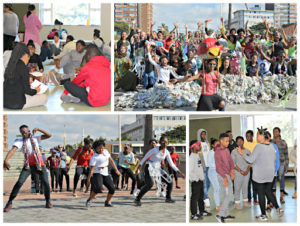
Happy memories of South Africa 2018
India and Sierra Leone Urvashi Sahni, founder and Director of the Study Hall Education Foundation (SHEF) is a pioneer and leading authority on the education of marginalised and disadvantaged girls and young women in India. An initial Zoom meeting between Urvashi and Ndeamoh Mansarray in Sierra Leone opened up the possibility of a fruitful dialogue.
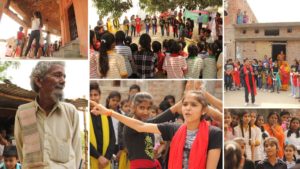
The young women of Study Hall take to the streets
Ndeamoh came to the first ARROW/Indra Congress in Plymouth 2010 and since then, despite any support from institution or co-ordinator, Ndeamoh has stayed in contact, trained as a journalist and, on her own initiative, set up an Indra related group of young women to support other young women and girls who have experienced rape, child marriage, FGM and other abuses and to tell their stories. We were very moved by Ndeamoh’s bravery and initiative. Urvashi offered a number of strategic proposals and steps that could help her establish the initiative. Urvashi also offered to mentor the project and link some of her students with Ndeamoh and her group to give ongoing support, advice and share experiences and ideas.
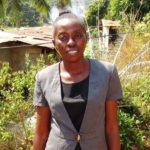
Ndeamoh: the beginning of a journey.
Greece and Brazil At a meeting with Betty Giannouli of Athens University in Greece and Marina Henriques of the University of Rio de Janeiro in Brazil, the potential connection and resonance between these two committed academics and practitioners was apparent. Marina works at the University in Rio where she teaches drama to students who will be working in school and community settings. She runs an ‘extension’ programme in which her students link up with young people in the huge Maré favela. The political situation in Brazil is currently very scary with an unhinged President who makes Trump look like a moderate liberal. Activists, educators, students and others literally live in fear of their lives. The Covid 19 pandemic enhances the insecurity.
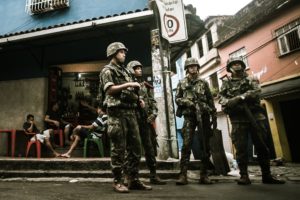
Armed police bring fear into the Mare favela……
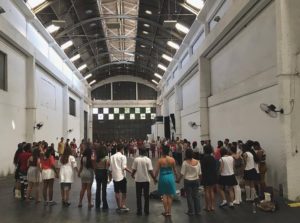
…..but inside the Mare Arts Centre the joy, the freedom to speak and express lives on.
Betty’s students are training as teachers and are undertaking a specific programme in drama pedagogy. Betty, both in her work with her students and more widely with her pivotal role with the Hellenic Theatre/Drama and Education Network in Greece (TENet – Gr), has worked with young people and children in refugee camps. She has a history of using forms of monologue to convey story and experience. Palestine, N.Ireland and the UK. Other conversations have involved Marina Barham of Al Harah Theatre in Beit Jala, Palestine with Mary Duddy of First Act Theatre, Derry and Sarah Pym of Access Theatre in Cornwall, UK. Together with the Occupation and the recent proposals by Netanyahu and Trump to annex yet more Palestinian land, Covid 19 has inflicted a double experience of lockdown. Marina, her family and colleagues are under intense pressure to cope with these complexities. Derry and Beit Jala have a previous history of co-operation and the conversation with Sarah Pym of Access Theatre, which works with diversely disabled people, opened up several areas of mutual interest.
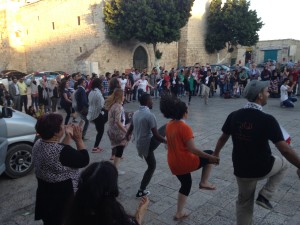
Inspiring memories from Manger Square 2016
Canada, Derry and Nigeria For some years Diane Conrad ran a Masters programme in drama, education and conflict at Alberta University. Some of her students joined us at Congress events and made valuable contributions. Unfortunately, the Master’s module is no longer running but Diane is hoping one her participants, now a practising teacher, will continue the contact. Diane and Jerry Adesewo, Director of the Royal Arjuna Theatre in Abuja developed a mutual point of concern, the devastating impact of oil extraction on land and indigenous people in both contexts. This was reflected in the Niger Delta, which has seen the destruction of communities and environment with appalling levels of pollution and political corruption. More recently Jerry and Matt Jennings of Ulster University have embarked on a creative, digital project linking young people and students in their respective contexts. Plymouth/Cornwall UK and Tunisia Indra director Alix Harris in Plymouth has begun a conversation with Asma Kaouech, Executive Director of youth and community cultural organisation ‘Fanni Raghman Ali’ in Tunisia. The dialogue will shortly be joined by Mark Laville of Falmouth University in Cornwall. Fanni Raghman Ali is a grassroots cultural organisation, arising from a groundswell of protest in the streets, a human rights organisation that seeks to nurture safe, creative spaces in the country ‘supporting the eradication of exclusion and exploring innovative, cultural and alternative ways to transform society’. The company produces vibrant street theatre incorporating a diverse range of art forms. Asma describes the work of the company as creating ‘cells’ in which disadvantaged young people can find a space in which their voices are listened to and respected. Many young people in Tunisia face multiple challenges including, largely because of the experience of exclusion, the temptation to join ISIS and other extremist organisations. The basic mission of Fanni Raghman Anni resonates closely with that of Indra and we look forward to developing this emerging dialogue.
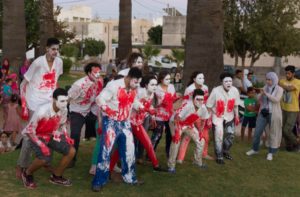
Young participants with Fanni Raghman Ali
Gathering evidence – making the case Our plans now for Indra are ambitious but the times call for nothing less. In order to attract the backing and funding required to meet our aims we need to provide evidence for the positive impact of engagement with Indra on the lives of participants. To this end we are gathering stories, experiences and insights of people who have been involved with Indra over the years. If any of the wider Friends of Indra have any stories or experiences they would like to share, do please let us know. We see Indra as a community of critical friends so critical observations are welcome to help us move forward! Similarly, if you are aware of or in contact with other groups of young people who share a commitment to global justice and conflict transformation through arts-based actions, please send us their contact details so that we can widen the network and expand our (at present) virtual circles. I am grateful for the expressions of interest from many of you over the years and I hope you will continue your support in the uncertain times ahead.
David June 2020
2. Notes from Indra Zoom meeting May 2020
Present: David Oddie, Tim Prentki, Lisa O’Neill-Rogan, Alix Harris, Mary Lange, Caroline Gleaves, Mary Duddy, May Duffy, Shannette Martin and team, Marina Barham, Chris Hunt, Artemis and Martha for Betty Giannouli, Diane Conrad, Matthew Jennings, Lucia Piquero.
Apologies pre meeting Dawn Melville, Miranda Young, Amber Tither, Betty Giannouli.
Post meeting: (Other business, time difference misunderstanding and internet connection) Urvashi Sahni, Ndeamoh Mansarray, Jerry Adesewo, Marina Henriques, Robin Tatam.
- Updates from hubs.
South Africa. ML described impact of lockdown. SA had a relatively positive approach to the pandemic and, as yet, statistics were not alarming regarding number of deaths. There was anxiety regarding potential surges of the virus in densely populated townships where lack of clean water, large numbers close together could create problems. Critics of government claim implementation of safety measures was slow and enforcement inconsistent. Government is reducing threat level from 4 to 3 with some easing.
ML expressed concern regarding casual approach of too many people, especially in dense urban settings, coupled with seeming arbitrary police actions. She cited a woman legitimately walking her dog being harassed by police. However, Mary commented on the traditional positive spirit of public solidarity in the country being helpful.
Schools are being opened to some learners from June 1st under strict guidelines. Bheki due to start school (Durban) but is concerned about lack of preparation and protection.
Shannette and her team reported from Cape Town where they are collectively locked down in a secure setting and able to prepare and rehearse their work within their compound.
- N. Ireland MD commented on position in Derry and shared her concern regarding the casualness of many people towards lockdown. Her young people were finding lockdown very difficult and she referred particularly to young people in isolated rural settings who did not have access to the internet. The impact of lockdown on the mental health of young people (and old) was a worrying feature. There were assumptions about people having access to the internet which endorsed and highlighted existing inequalities.
Mainland UK. More widely across the UK Lisa endorsed the challenges faced by disadvantaged young people in dealing with isolation and its impact on their mental health and well-being. A member of the young people’s Indra group in Rochdale, already struggling with insecurity and anxiety, had attempted to take their own life that week and people at the meeting shared Lisa’s sadness and concern.
LO also endorsed the concern about the disregard shown by many people to the demands of lockdown. AH endorsed this also. AH had limited contact with her Indra group as several were key health workers themselves. Caroline Gleaves from Gorse Hill studios in Manchester described her concern about the impact of losing ‘live’ interaction on the studio’s participants.
MJ, who is lecturing at the University of Ulster shared the frustrations of converting taught classes, especially practical sessions, into a digital format and the pressures this put on staff and students. Matt was currently embarking on a dialogue with Jerry Adesewo in Nigeria with some of his students. Matt also commented briefly about the work he was currently involved with in relation to ‘Performing Care’, especially with regard to the training of nurses.
Palestine. MB explained how the coronavirus had been introduced into the West Bank by tourists staying at the Angel Hotel – where Indra based its Congress in 2016. Bethlehem is dependent on tourism so this was catastrophic. The combination of Occupation, Netanyahu’s plans for Israel to annex yet more of the West Bank and the virus have created huge pressures for people in Palestine, for example, funding regulations from international funders, such as the EU, are now insisting on terms which make it impossible for cultural organisations to speak freely. Theatres and other cultural organisations stand to lose significant core funding.
Marina also spoke with real concern about people ignoring the need for distancing and not sticking to necessary lockdown measures. Her own mother is very fragile and so Marina is herself under strict lockdown. However, Marina has been running an online training programme for artists in the Middle East facilitating processes for creating and promoting cultural programmes. Al Harah has also been supporting other companies in the Middle East with digital performances of their own work.
Marina is very conscious of the contrasting experience of lockdown for those who have access to technology and those who do not. As in other settings lockdown has highlighted existing inequalities within society. For a people who live much of their lives in constant surveillance the pandemic has created a situation that has worrying implications. Authorities world-wide are using sophisticated developments in technology to track and trace people for health purposes, a process justified in a context of genuine global emergency. The concern is what happens after the pandemic is over but the technology is still in place? For example, Israel, which probably leads the world in this area, will have enhanced capacity for surveillance of Palestinian people. At a personal level suicide figures are concerning and exacerbated through lockdown and curfew.
Malta. Lucia Piquero gave a summary of the situation in Malta. She emphasised that Malta was an island and that created opportunities to isolate people more readily. The spread of the virus seems to have been contained and reported deaths are in single figures. Lucia teaches dance at the University of Malta and, like others in HE performance studies, has been heavily pre-occupied with the struggle to teach dance courses digitally.
Brazil. Marina Henriques from the university of Rio de Janeiro was not able to attend due to time difference misunderstandings. However, T P, who just a few months ago was working with Marina in Brazil, offered information on the situation there in which Marina works. Brazil is currently led by a leader who has the hallmarks of a brutal Roman Emperor and who makes his role model, Donald Trump, look like a moderate liberal. Bolsinaro has been callous in his disregard for the impact of the coronavirus, ignored the advice of health experts and created a very worrying, frightening situation for citizens in Brazil.
Marina teaches at the University of Rio, focussing on using drama in education. She runs an ‘extension’ programme, which involves students undertaking projects in the huge Maré favela, one of the largest favelas in the country. In Maré there is an arts centre and the students work with young people there who in turn are encouraged to go to the university.
The situation in the favelas is currently desperate as police are using the current situation to increase arbitrary raids, which have a created climate of fear. The police undertake these raids with ‘guns blazing.’
In relation to Brazil, and indeed more widely, Tim endorsed the point made by Marina regarding the extreme powers currently being made available to giant technology corporations and state agencies and the real fear as to their continuance once lockdown is over. A state of emergency gives governments the powers to introduce measures that lead to control over the freedom of movement, assembly and surveillance of citizens. Once the emergency ends many of the authoritarian governments only too prevalent in today’s world will be reluctant to relinquish these powers and they may become absorbed into everyday political reality.
Greece. Betty Giannouli was unable to attend the meeting but two students, Artemis and Martha, spoke on her behalf. As in other contexts, lockdown is a cause of extreme anxiety and frustration for young people. The Greek government had acted quickly when the pandemic started and consequently the number of deaths has been kept to around 150. The authorities were aware, following the years of austerity, that the health system would have collapsed under extreme pressure. There is anxiety regarding the plight of refugees on Greek islands who are living in tightly packed, insanitary camps.
Artemis spoke movingly about the impact of the workshop that Betty and the Greek students shared with Marina Henriques’s students in Rio. It was a rich exchange and dialogue.
India and Sierra Leone. Neither Ndeamoh or Urvashi were present but DO spoke briefly about the collaboration that has been developing to support Ndeamoh in her project with young women in the country. Both Urvashi and DO had been moved by the initiative and were keen to offer support. Over recent decades Sierra Leone has suffered crisis after crisis, civil war, Ebola, flooding and now the Covid 19 pandemic.
Canada. Diane Conrad was no longer running the Master’s course which provided student involvement in Indra activities. However, one of her previous students, Josh, had expressed interest in engaging with Indra again in his own teaching capacity. Diane spoke about a dialogue emerging with Jerry in Nigeria regarding the experience of oil extraction in their respective countries and its impact on local people and environment.
- Lucknow.
Urvashi Sahni had proposed a Congress in Lucknow for the Autumn of 2021. The timing had been determined by the seasonal weather. One intention of this meeting was to allow Urvashi an opportunity to share thoughts about the proposed event.
Urvashi was unable to attend personally but a lively discussion followed. Doubts were expressed regarding the viability of holding a live Congress in 2021. To raise funds for these events requires advanced planning and bid making. However, for the immediate and even foreseeable future, most funding streams were currently closed except for specific Covid 19 related projects. Seeking funding for air travel in the foreseeable future is unlikely to be deemed a priority.
There was a groundswell of opinion for postponing the live Congress but, in the absence of Urvashi, no final decision was made.
LO made the observation that several Indra partners face uncertainty in relation to their jobs, which discouraged ambitious planning for such events as this.
Alternative approaches were discussed, such as digital events, a global Indra ‘Festival’ using a diverse range of systems and formats. A number of very exciting bi-lateral projects have already been initiated in recent weeks and there is an opportunity to build on these developments and share them across the network.
The next year could be seen as an opportunity to build on and consolidate the momentum started over recent months to create a more robust and sustainable model for Indra to move forward. Participants responded enthusiastically to the notion of local live performances feeding into an international digital congress.
|